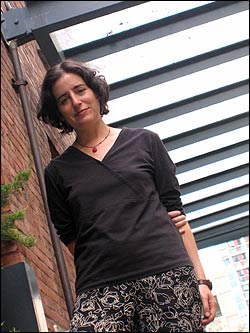GO AND SEE The Aristocrats and count how many of the comics are female. The percentage isn’t that encouraging, and it’s also felt among women humorists who work in print. Righting that ratio is part of the mission of locally published Swivel magazine (“the nexus of women and wit”), which celebrates its third issue with The Indiscretions Road Show (Bagley Wright Theatre, 3 p.m. Monday, Sept. 5), featuring several of its contributors. Expected are the Bay Area’s Vendela Vida (And Now You Can Go), local comic-strip artist Ellen Forney, Ali Davis (True Porn Clerk Diaries), Seattle comedian Lauren Weedman (see related story), and Aimee Bender. Praising Bender’s Willful Creatures last week, our Laura Cassidy said her stories are “full of perverted deviants, greedy lovers, fantastical beings, and dry, quotidian observations.” Bender also contributes to the new anthology The Modern Jewish Girl’s Guide to Guilt.
We sat down with the L.A.-based Bender during a Seattle visit last week to talk about women writing humor. Is it an oxymoron? Is the situation getting better? And did Seattle editor Brangien Davis pitch Swivel as a humor magazine to her? “When she first contacted me, it was about comedy. It was about stories that were funny and were written by women. And I really appreciate that, because I think often people will not connect the two—and think that women are writing domestic seriousness and men are the comics.”
Of the traditional humor mag category, whether it be The National Lampoon or Spy or The Onion, she notes, “It’s all male. It just seems really important that women aren’t going through a male lens to join that club. I think what [Davis] is going to do here is form a new club and say, ‘What are things that are funny to women?’ And I think what’s interesting to me about comedy . . . [is that] I’m never aware of it being funny when I’m writing it.”
For Bender, as she encourages her writing students at USC, it’s all about finding a distinct, often oddball voice: “It’s incredibly fun to write from the point of view of a very judgmental character or a very vicious character”—as opposed to the stereotypical nice girl. “It’s all about aggression, too. I think that Freud’s theory about comedy is that it says the things we’re afraid to admit. And maybe for women, that’s part of the reason it gets subdued; there’s this sort of aggression repression.”
Yet, pace Mean Girls and Queen Bees, this is changing, she thinks. “It feels like there’s more of a kind of abrasive tough girl as a cool thing and not a fringe character anymore. I think of something like Sex and the City even having a huge influence that way. A young woman can pick her identity from many more choices.”
Not that Bender, fond of absurd twists and transformations in her stories, is immersed in pop culture—even though she lives in Hollywood. “It’s great to be a prose writer in a screenwriter city, because I can let it all wash over me. It feels like a very nicely anonymous place to be a fiction writer. You go to a cafe, and there are all these people with their laptops, and they’re all working on their screenplays.”
So what holds up as humor in our age of ephemeral laughs and cyber- distractions? “There’s something in the absurd that’s also kind of funny and hopefully undatable. That’s where a kind of mythic humor can come in. If an image is bizarre enough, it can make someone laugh. It’s all about language, too. Certain words are funny, and certain words aren’t funny. And that’s so visceral; it’s hard to tell until you hear it.”
THERE’S OTHER GOOD ink-related stuff at Bumbershoot, of course. A literary mosh pit will likely erupt for a group reading from McSweeney’s founder Dave Eggers, NPR star Sarah Vowel, Daniel Handler (the Lemony Snicket books), and others (McCaw Hall, 8 p.m. Saturday, Sept. 3). What with all the shrieking and fainting in the audience, it’ll probably be like the Beatles at Shea Stadium in ’65. (And guys, please refrain from tossing your boxers at Vowel.) Handler also does a separate Snicket program with music, which is perhaps more geared for kids (Bagley Wright, 2:30 p.m. Saturday, Sept. 3). Novelist (Misfortune) and musician John Wesley Harding performs in both idioms (Bagley Wright, 4:15 p.m. Sunday, Sept. 4; also see CD-R Go!). Then there’s a big poetry throw-down (Bagley Wright, 8:15 p.m. Monday, Sept. 5), with heavyweight contenders Roger Bonair-Agard, Sonya Renee, and Buddy Wakefield. Expect folding-metal chairs to be thrown. At the Seattle Center’s Alki Room (north of KeyArena), there will be various panels, discussions, and readings all through the Labor Day Weekend. See www.bumbershoot.org for full schedule and details.








